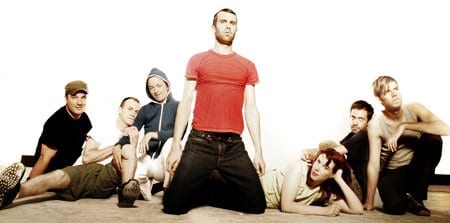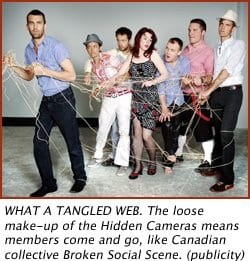A conversation with Joel Gibb is nothing like one would expect.
The enigmatic songwriter for The Hidden Cameras, onstage Gibb is an extroverted frontman with heart-on-sleeve, provocative lyrics. But an interview with Gibb reveals a different side.
Essentially the vehicle for Gibb’s songs and artistic endeavours, The Hidden Cameras is comprised of 11 (sometimes more, sometimes less) bandmates, many of whom are based in Toronto. With a revolving door of musicians that has seen the likes of Owen Pallett, Reg Vermue and Maggie MacDonald, the Hidden Cameras have attracted a veritable media circus of attention since 2001.
It hasn’t been simply the notable talent, or Gibb’s quirky, sleeve-tugging pop songs but from the start the band has been sexy and provocative, pushing comfort zones with their self-styled ‘gay church folk music,’ religious references, and their delightfully nearly nude Go Go dancers.
Of course the press love them. Of course Gibb has done more interviews than he can count. (Which might explain why he’s now living in Berlin without a phone.)
The Hidden Cameras have become a phenomenon. A band that every queer, intelligent, artsy boy and girl can revel in. For a few blissful hours, paradise can be found at The Hidden Cameras’ live show, dancing amidst banners handmade by Gibb, eyes on the very cute band, one’s mind deciphering layer upon layer of meaning in Gibb’s lyrics.
But then there’s the interview with Gibb: a torturous process. Even more torturous because the discomfort is so unexpected.
From a neighbour’s phone in his apartment building in Berlin, Gibb seems quiet and withdrawn, almost reluctant to answer questions at first. But he begins to try and something becomes clear. Gibb doesn’t have the smooth pre-planned answers one would expect from a highly publicised band.
Despite the fact that Gibb knows the questions press will ask, instead of slipping us a less than genuine answer that he knows will please, he actually tries to answer. The result is a painfully sincere awkwardness as Gibb tries to put into words his music, his art and his sexuality — all aspects of himself that he would strongly prefer not to dissect and examine.
Awoo, released in 2006, was The Hidden Cameras’ fourth album. Like the previous releases, there is a juxtaposition of sweetness and darkness lurking just beneath the surface. Knowing and loving the album, it’s irresistible to want to know the connection in Gibb’s mind between his sexuality and his music.
This is apparently a cloying question. Gibb sighs patiently before replying.
“I don’t try to analyse myself. I really don’t think about things that way. If you analyse yourself too much it fucks it up, you know? How could I quantify my sexuality? Its imbued in every piece of my DNA, just like its imbued in my lyrics in every song I make, as is my personality and my creativity.”
By asking Gibb to analyse his work, the media is really asking him to make it one dimensional, easier for us to understand. And its something he won’t do.
“It’s like people ask me, ‘What’s the difference between your albums?’ and my answer is, ‘I don’t know.’ To me it’s all the same, it’s so personal because they’re all my songs. At the same time, each song is comprised of many different things. To me, every lyric can mean so many different things. I can’t come up with grandiose explanations. Every song means everything.”
So essentially, the lesson is that the whole is more than the sum of its parts. But Gibb shares more of himself as he continues, trying to explain his philosophy on the art of songwriting.
“If you’re too self-conscious, too deliberate, it doesn’t work. I try not to analyse my work. I just try to channel the creative process. I like to go to the park, sit on a bench and write. You can’t over-think these things. But it’s when you’re living and not thinking that the best songs appear. Making art is about not thinking — it’s about freeing yourself.”
In this very Zen moment, what is evident and as true as the awkward pauses over the phone is that Gibb truly believes in what he says.
As an artist, publicity hasn’t smoothed his responses and commercialism hasn’t changed his focus. It’s a tiny clue into the charm of The Hidden Cameras — Gibb continues to write only for himself, paying homage to the spirit of art.


 Why you can trust Xtra
Why you can trust Xtra


